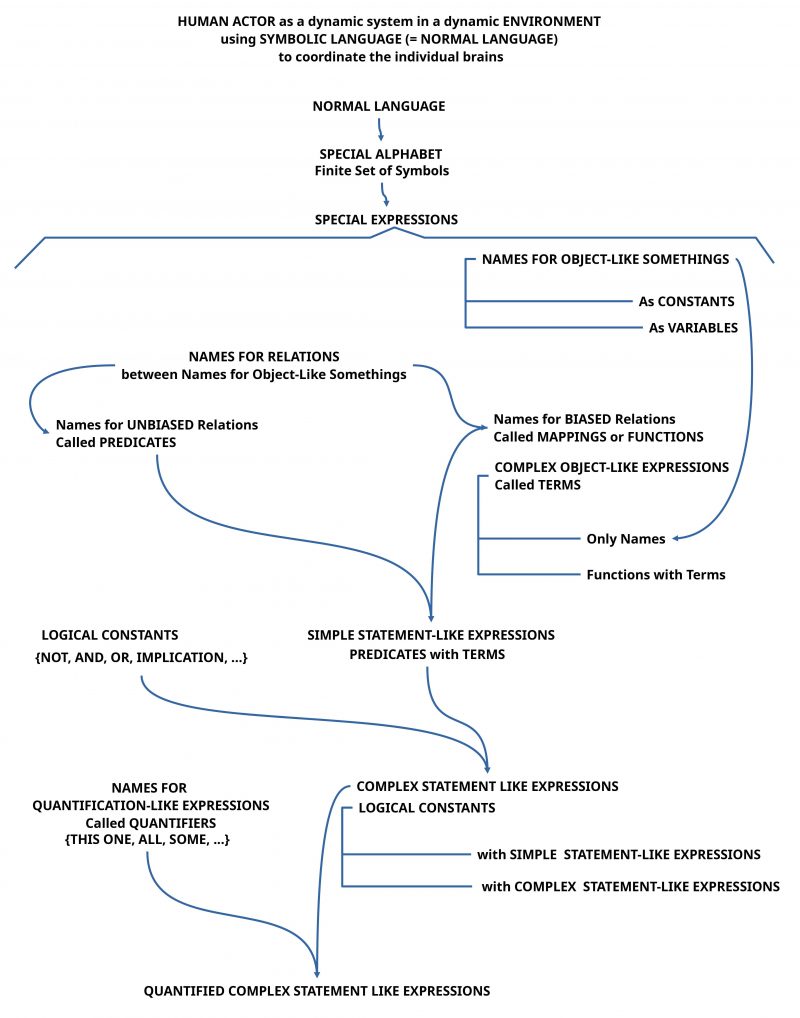eJournal: uffmm.org
ISSN 2567-6458, 19.August 2022 – 19 August 2022
Email: info@uffmm.org
Author: Gerd Doeben-Henisch
Email: gerd@doeben-henisch.de
CONTEXT
This text is part of the subject COMMON SCIENCE as Sustainable Applied Empirical Theory, besides ENGINEERING, in a SOCIETY. It is a preliminary version, which is intended to become part of a book.
Predicate Logic

So-called ‘predicate logic’ can be found since the classical Greek philosophy (cf. [7], chapter 2), but in the ‘old times’ not in the format which we know and are using since Frege, Russel & Whitehead and others since the 20th century.
What one can observe in the talking about predicate logic is a constant reduction of the properties of predicate logic as well as the circumstances of usage. While we can find in the collection of texts associated with Aristotle called ‘Organon’ different dimensions beyond the pure expressions — in a not complete systematic way — do modern texts restrict themselves more or less to expressions only …. in theory, not in practice.
To discuss the topic of predicate logic in an everyday setting we will start with predicate logic from the point of view of expressions only and then we will try a look to the ‘conditions of usage’.
In the outline presented in figure 4 we take as a common assumption that human actors are the main actors producing and using predicate logic. From these human actors we know that they are ‘complex dynamic systems’ living in a complex dynamic environment (with the human actors as part of this environment making it even more complex than without human actors). Furthermore it is a historical fact that the homo sapiens population demonstrates since its beginning (before about 300.000 years somewhere in Africa) the special ability that their brains — embedded in their bodies — can organize a ‘communication by symbolic means’ in a way which enables these individual distributed brains to ‘coordinate’ the ‘behavior’ of their bodies in a growing complex manner. History shows how the ‘technology of communication’ has changed constantly beginning with written symbols, texts, libraries, data bases, connected data bases within computer networks called ‘cyberspace’.
Besides many thousands of ‘ordinary (= normal) languages’ the brains of the homo sapiens population have invented many ‘specialized languages’ extending the normal languages in many directions. Such a specialized language’ is completely depending from the given normal language. Without the used natural language a specialized language cannot exist; a specialized language as such is ‘nothing’; with a normal language as starting point a specialized language can allow quite complex ‘artificial symbolic structures’ which — used in an ‘adequate manner’ — can help the acting brains to ‘describe possible meanings’ which can eventually help to understand some parts of the ‘perceivable world outside the brain’ (and thereby some behavior of the brain itself!)
— draft version —
